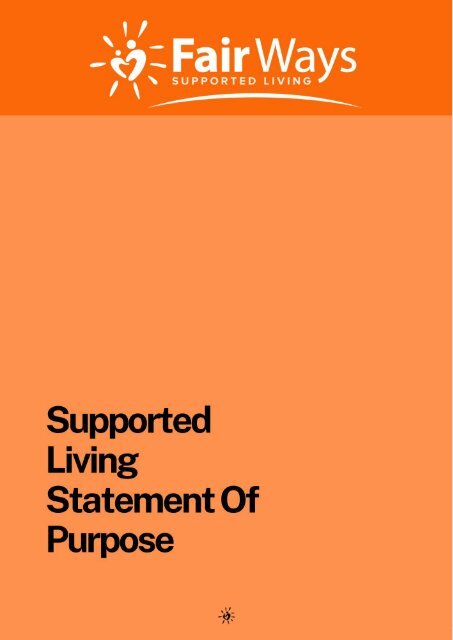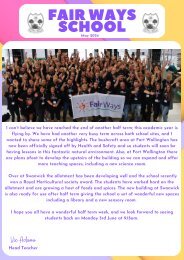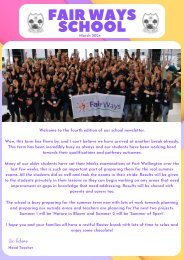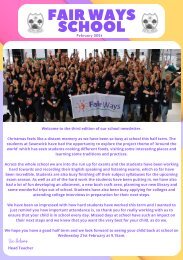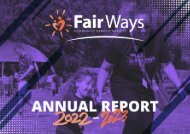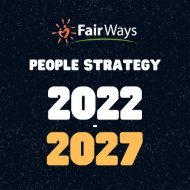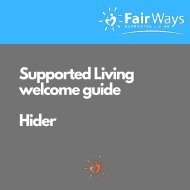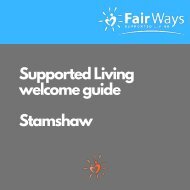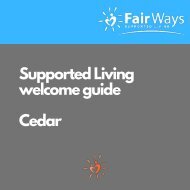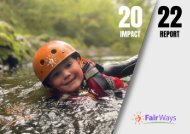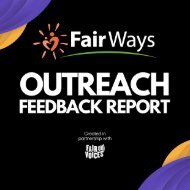SL Statement Of Purpose FINAL June 23
You also want an ePaper? Increase the reach of your titles
YUMPU automatically turns print PDFs into web optimized ePapers that Google loves.
1
Contents<br />
Fair Ways Values ........................................................................................................................ 3<br />
Supported Living purpose, ethos, core aims & function. .......................................................... 4<br />
Accommodation ......................................................................................................................... 5<br />
Services ...................................................................................................................................... 7<br />
Providers Address ...................................................................................................................... 9<br />
Staffing Arrangements ............................................................................................................... 9<br />
The young person’s rights and views. ...................................................................................... 10<br />
Positive Outcomes ................................................................................................................... 11<br />
Protection and promotion of mental and physical health ...................................................... 15<br />
Equality and Diversity .............................................................................................................. 18<br />
Complaints/Compliments ........................................................................................................ 19<br />
2
Fair Ways Values<br />
Our Mission<br />
Making a difference through passionate care, support, and education.<br />
Our Values<br />
As a charity, we measure our wealth by making a difference, not by making a profit.<br />
By creating a culture that values every individual, we can harness and develop their potential so that they may<br />
achieve great things.<br />
1. Make a difference.<br />
2. Never give up.<br />
3. Value every individual.<br />
4. Listen to each other, develop each other, and reach our potential.<br />
5. Quality and passion in what we do.<br />
Our Culture<br />
We want Fair Ways to be an enjoyable, exciting, and welcoming place where:<br />
• Professional: We do what we say we will do when we said we would do it.<br />
• Accepting: We are inclusive, and open-minded and treat each other with respect.<br />
• Reflective: We focus on learning, not blaming.<br />
• Transparent: We are open, honest, and have integrity.<br />
We fully expect everyone to play their P.A.R.T. in creating the culture our employees and young people deserve.<br />
3
Supported Living purpose, ethos, core aims & function.<br />
<strong>Purpose</strong>:<br />
At Fair Ways Supported Living, our goal is to create a welcoming, inclusive, and secure environment that offers<br />
appropriate staffing levels to assist our young people in acquiring the practical and emotional skills necessary for<br />
independent living. We believe in fostering positive relationships and secure attachments to encourage active<br />
engagement within the community. Throughout this process, we prioritize the involvement of young people in<br />
decision-making regarding their support while ensuring their privacy and dignity are respected. Ultimately, our aim is<br />
to enhance the prospects of young individuals accessing independent accommodation, promoting positive future<br />
outcomes.<br />
While we strive to provide stability, consistency, and acceptance, it is essential to emphasize young people’s<br />
responsibility for themselves. Our staff members provide a safe and secure environment whilst offering support, and<br />
guidance. The team also document relevant information and provide necessary reports, rather than giving orders or<br />
instructions.<br />
Ethos:<br />
Young people who access Fair Ways Supported Living services are likely to have experienced disrupted adolescence<br />
and be lacking the independence, and social and emotional coping skills necessary for a productive start to adulthood.<br />
We are aware that some young people find the transition to adulthood a very challenging time and can leave the care<br />
system unprepared and can be unable or unwilling to engage in the support offered to them. We acknowledge that<br />
this is a very daunting time for young people; when the average age for young people leaving home for the first time<br />
is in their late twenties there is an expectation of accelerated adulthood for the most vulnerable young people. The<br />
expectation for them to be prepared and ready to be fully independent at age 18 can often be unfulfilled.<br />
Young people who have poor internal control mechanisms are likely to feel out of control of their own pathway and<br />
feel that their fate (future) is to be determined by external forces. Young people struggle to understand that they<br />
have a choice to change their situation.<br />
We believe that by working with young people to develop a greater belief and understanding of their relationship<br />
with the world in which they live we are able to develop their internal loci of control and increase their ability to<br />
engage in pro-social interactions with society and their local community. The home promotes and supports Family<br />
and social contacts as these relationships are often recognised as part of the therapeutic process.<br />
Partnership working is at the forefront of our values to promote positive outcomes so that every effort is made to<br />
effectively engage and work the young people to achieve positive outcomes. Fair Ways seek to work with all<br />
professionals of the wider system to assist in meeting the needs and safety of young people.<br />
Core aims & function:<br />
The core aims and function of our Supported Living service are focused on promoting independence and providing a<br />
safe, nurturing, and supportive environment for young people who lack a stable family or home.<br />
Our primary goal is to help them develop the necessary skills, confidence, and independence for a successful<br />
transition into adulthood.<br />
Child-centric support is at the heart of our services. We prioritize the well-being, development, and individual needs<br />
of each child under our care. Our approach revolves around creating a nurturing and empowering environment that<br />
encourages their growth, fosters their strengths, and addresses their unique challenges. We strive to involve children<br />
actively in decision-making processes, respecting their autonomy and preferences. By tailoring our support to meet<br />
their specific requirements, we aim to provide a holistic and child-centred approach that promotes their overall<br />
welfare and helps them thrive.<br />
4
Accommodation<br />
Fair Ways Supported Living services offers the following category:<br />
‘supported living in a shared or group living situation in premises used to accommodate only looked after children(6)<br />
or care leavers(7);’<br />
The Characteristics<br />
Fair Ways offers 20 beds across 4 homes to young people who are under the care/responsibility of the local<br />
authority. Our service focuses on providing accommodation to individuals aged 16-25, of any gender and ethnicity.<br />
At Fair Ways, all young people are carefully matched to ensure that the individual needs of the young people can be<br />
best met through the appropriate level of skill and experience.<br />
Fair Ways have a designated Placements team who works collaboratively with management to identify the best<br />
possible match for both the young people and the identified home. Potential referrals will be carefully assessed by<br />
the management team to ensure that:<br />
1. The home can effectively meet young people’s needs.<br />
2. The needs fall within the home’s <strong>Statement</strong> of <strong>Purpose</strong>.<br />
3. Effective placement planning and risk assessments can be achieved upon assessment of the needs and risks<br />
to ensure the safety of the home and matching risks.<br />
Placements cannot be considered for:<br />
• Individuals who require continuous psychiatric supervision.<br />
• Individuals who pose a serious physical threat to themselves or others.<br />
• Individuals who have profound learning disabilities or physical disabilities<br />
• Individuals who cannot safely manage and store medication independently.<br />
• Individuals that pose current or concerning arson risks/behaviours.<br />
• Individuals that are subject to DOLS.<br />
• Individuals that are unable to have unsupervised time.<br />
• Individuals that require personal care.<br />
All young people will begin placement on an assessment period which will be discussed and explained prior to a<br />
placement being offered. The assessment length will be determined by the referral information including presenting<br />
and historic risk levels. An assessment period is usually within but not conclusive of the 4-6 weeks ‘timeframe. Upon<br />
a formal offer being made by Fair Ways, the following documents are required to be sent to the home upon<br />
admission.<br />
• T&C signed and returned<br />
• Admission information document<br />
• Referral<br />
• Risk assessment<br />
• Care plan<br />
• Life Chronology<br />
• Medical information (LAC medical health assessment)<br />
• Legal information<br />
• Education assessments<br />
• Social worker name<br />
• IRO name<br />
• Any other key names and addresses<br />
Young people are central to the placement process and engaging them effectively is crucial to the successful<br />
outcome of all placements. We will use our skills and experience to ensure that the young people’s views are<br />
listened to and respected through consent forms, the admission document, and the initial admission information.<br />
Where possible we will always look to implement a transition into the home and where possible the young people<br />
should be visited in their current placement, provided with the opportunity to visit the home, and be given the<br />
5
opportunity to be a part of the decision-making process about the possible move however due to the nature of our<br />
service we also consider accommodating emergency placements. We can provide the young people with our<br />
welcome guide so that they have as much information on the home and service as possible upon request.<br />
If our young people become unsuitable for the service due to their level of risk, the service will organise a<br />
professional meeting to identify if the home can continue to meet the needs, manage the risk and safeguard other<br />
young people placed. If it is concluded that we cannot any longer keep this young person safe or the needs of the<br />
home, then we issue 28 days’ notice of placement termination to the local authority or care leavers team. We will<br />
then look to hold a discussion with the young person to advise and implement a safe transition plan. If the risks are<br />
assessed as significantly unsafe, the service management team will assess the suitability of the placement. In cases<br />
where safety is compromised, the termination of the placement may occur earlier than the expected 28-day period.<br />
The Facilities - Description of the homes<br />
Type: All properties are unmarked/unbranded to blend in with society to prevent the feeling of being different and<br />
promote ‘normal’ living arrangements.<br />
Hider Home is a low-needs Supported Living home situated in the heart of a residential neighbourhood in Woolston,<br />
Southampton. It has easy access to the railway station and bus routes, making easy access to Southampton’s central<br />
and outside areas such as Portsmouth. The home is set up to support 5 young people. The home is supported with<br />
daily input from a small team of staff that provides identified hours of support. Sleep in staff enables the home to<br />
have support in the case of an emergency every evening.<br />
Cedar Home is a high-needs supportive living home situated in Portswood, Southampton. It is within walking<br />
distance from Portswood high street and a short distance from Southampton city centre, making it easy to access<br />
railway and bus station routes. The home is structured over 2 levels and aims to provide a homely, therapeutic<br />
environment to support 5 young people aged between 16-25 years who have complex needs. We provide higher<br />
levels of support in this home to ensure that we meet the high needs of the young people.<br />
Stamshaw Home is a high-needs supportive living home situated in Stamshaw, Portsmouth. The home is within<br />
walking distance from a local precinct and has access to the local railway and bus station routes. Stamshaw can<br />
accommodate up to 6 young people aged between 16-25 years of age who display high complex needs. This home is<br />
3 individual terraced houses structured over three floors, with each home accommodating two young people. We<br />
provide higher levels of support in this home to ensure that we meet the high needs of the young people.<br />
Hillside Home is a high-needs supportive living home situated in Slade, Bath. The home has access to local<br />
supermarkets and is easily accessible to the bus and train station which provides a direct route into Bath city centre.<br />
Hillside can accommodate up to 4 young people who display high complex needs and are looked after young people<br />
or care leavers. The home is a converted bungalow structured over three floors. We provide higher levels of support<br />
in this home.<br />
Size: All properties are of the typical size of a family home offering homes that are 2-7 bedrooms with adequate size<br />
communal areas.<br />
Location: The homes are located in both the South and West of England. The homes are situated in locations that<br />
are appropriately situated in local areas so that young people can access:<br />
• Transport connections (train stations, bus stops)<br />
• Food access (Supermarkets)<br />
• Health requirements (Doctor surgery, opticians, dentist)<br />
• Education (Local college)<br />
• Employment opportunities<br />
Amenities: All homes offer:<br />
• Wi-Fi<br />
• Smart Televisions in both communal and personal bedroom areas<br />
6
• Heating<br />
• Laundry facilities<br />
• Communal kitchen for preparation of food<br />
• Communal bathroom<br />
Privacy: All young people have their own bedroom space which is private to them. Their bedrooms provide sufficient<br />
space to accommodate a reasonable number of possessions, are equipped to meet the individual’s needs, and has<br />
access to Internet connectivity via Wi-Fi. Communal areas are provided (kitchen, lounge area, garden etc.) In the<br />
event that a young person is studying from home, then adequate furniture (desk) would be purchased and set up in<br />
an appropriate area of the home.<br />
Security: All homes are fitted with adequate security devices to allow all young people to feel safe and secure in<br />
their home, these include locked devices to doors, windows, and a lockable door to their own bedroom space.<br />
Bathrooms also have lockable devices for privacy.<br />
Homes also offer CCTV to monitor the front and rear of the properties to monitor surveillance and security of the<br />
property and the individuals within. CCTV acquires consent to be understood and signed by the placing authority and<br />
the young people to comply with the Protection of Freedoms Act 2012 and the Surveillance Camera Code of Conduct<br />
(Home <strong>Of</strong>fice 2013)<br />
All properties are subject to a location risk assessment.<br />
Atmosphere: All homes offer a peaceful and quiet atmosphere with the intention of providing a safe and secure<br />
environment. The homes are decorated in a way that allows the young people to call them ‘home’, young people are<br />
consulted when the homes are decorated to gain their thoughts/ideas which are then considered prior to<br />
decoration.<br />
Services<br />
Fair Ways Supported Living is currently an unregulated service that provides accommodation to young people of any<br />
gender aged between 16-25 years of age. *The service is in the process of preparing for regulation under OFSTED*<br />
The services offered at Fair Ways Supported Accommodation include:<br />
Hours-based model of support/care. We take pride in delivering a personalized and flexible support system based<br />
on an hourly model, tailored to meet the specific needs of each young person. To reinforce this approach, we have<br />
developed a variety of services that offer a gradual reduction in support, and we have integrated an outcome star<br />
tool. This tool serves the dual purpose of supporting the individuals and measuring their progress as we assess their<br />
development.<br />
The aim is to monitor and promote the decrease of support hours provided to each individual as the placement<br />
progresses to develop independence and prepare their skills and confidence to be able to live independently.<br />
Staying Close<br />
At 18 years of age, many young people face a cliff edge of leaving supported care, to little or no support. They are<br />
often forced to move a great distance from their family and social networks. Their established professional<br />
relationships which are key supports for the young people, are often completely severed. Young people will have no<br />
clear plan for accommodation, and this may lead to a spiral of negative behaviours with poor outcomes.<br />
Fair Ways Staying Close provides support for young people who present with high levels of complex needs and<br />
vulnerabilities. Our support emphasises the importance of key relationships in a young person’s life and a<br />
commitment to long-term planning. Our Staying Close model extends these principles for young people with<br />
complex needs leaving our care, to begin to prepare them for adulthood and reduce the ‘cliff edge’ they would<br />
otherwise experience.<br />
7
Staying Close provides ongoing support while young people transition first into Supported Living from residential<br />
care, and then on into independence. When the young people we support move on into semi-independence and<br />
independence, support can then take place in the form of outreach to maintain healthy relationships and promote<br />
further positive outcomes.<br />
The desired outcomes of Fair Ways Staying Close is for all young people to have Sustained relationships with<br />
consistent key professionals, A reduction in anxiety regarding their long-term care planning and safe, secure, and<br />
sustained accommodation post-18. Staying Close is designed to prove that by providing support to young people<br />
past the age of 18, their chances in life are much improved. Fair Ways are invested in the journey for all young<br />
people and are committed to this opportunity to shape a better future for all young people.<br />
“The staff at Fair Ways are all I have, I never had this before. I don’t want to leave and have no one outside of here. I<br />
am glad I get to keep those important people in my life. Staying close should be an option for all care leavers.”<br />
- A care leaver of Fair Ways (2022)<br />
Further information can be provided upon request.<br />
Clinical services (Fair Ways HUB)<br />
We are invested in every individual and believe that we need to enhance and maximize everyone’s full potential<br />
through education, vocation, and support offered by highly skilled and specialised staff to incorporate our ‘team<br />
around the relationship’ approach. All young people will have access to the Fair Ways Hub.<br />
The Hub is a multi-disciplinary therapeutic service central to all other Fair Ways services. Its aim is to ensure young<br />
people’s emotional & social needs are identified through effective screening and clinical assessment. The Hub team,<br />
work with other Fair Ways staff teams through supervision and training to ensure the most appropriate support and<br />
evidence-based interventions are embedded to help meet the young people’s needs. The Hub will deliver specific,<br />
time-limited evidence-based interventions where appropriate following a comprehensive clinical assessment and will<br />
also work with local mainstream and specialist services including wider professional networks to ensure seamless<br />
pathways for care and treatment and to help identify appropriate thresholds between The Hub and Community<br />
CAMHS.<br />
The Hub does not act as an emergency service and Fair Ways employees are supported and educated on appropriate<br />
pathways in the case of an emergency.<br />
Education lead<br />
Fair Ways recognise that individuals who access Supported Living may have experienced, disrupted education, and<br />
can often struggle to reintegrate into this environment. Fair Ways also have access to an education lead who<br />
oversees education and employment for all young people in the service. The Education lead works alongside the the<br />
young people to maximise their employment and educational opportunities to achieve their goals and future<br />
aspirations whilst understanding their specific needs.<br />
8
“Me being in college, me going to my apprenticeship….if she (Fair Ways Education lead) wasn’t there guiding me<br />
through it and being there for me to talk to…. I don’t think I would have got as far as I am now. She helped me<br />
through my struggles and showed me a way.”<br />
- Care leaver of Fair Ways 2021.<br />
Fair Ways Outdoor Adventures<br />
Fair Ways Outdoor Adventures provides a wide range of innovative outdoor education services within Fair Ways. The<br />
services currently include Activity Camps, The Duke of Edinburgh's Award Expeditions, Teambuilding, and<br />
Adventurous Activity days.<br />
The team prides itself on providing a high-quality bespoke outdoor education solution. To help meet this aim they<br />
use modern equipment and experienced activity instructors.<br />
“I struggle to put into words how I found the experience, but I did really enjoy it and would love to go again.”<br />
- Young person, 20<strong>23</strong><br />
Providers Address<br />
Staffing Arrangements<br />
The work address for all individuals:<br />
Fair Ways Head <strong>Of</strong>fice:<br />
Lakeside<br />
Ground Floor, Building 1000<br />
Western Road<br />
Portsmouth<br />
Hampshire<br />
PO6 3EZ<br />
Email: hello@fairways.co<br />
Website: www.fairways.co<br />
9
A general summary of common staffing arrangements in our homes:<br />
1. Operations Manager/Deputy Manager: The management team oversees the overall operation of the<br />
Supported Living homes. They are responsible for ensuring that the facility meets all regulatory standards,<br />
managing staff, coordinating programs and activities, and maintaining communication with<br />
parents/guardians and the professional network.<br />
2. Support Staff: Support staff members play a crucial role in supporting the operations of the homes, and<br />
contribute to the smooth functioning of the facility and maintaining a clean and safe environment. Support<br />
staff are our frontline workers who work directly with our young people providing support during the day<br />
and offering sleep-in shifts throughout the night.<br />
3. Qualified Professionals: Depending on the specific needs of the young people, Supported Living has access to<br />
clinically qualified professionals whom we can access, for any specific work, in an attempt to meet young<br />
people’s needs.<br />
4. On-call Staff: In case of emergencies or unforeseen situations, on-call staff members can be contacted<br />
outside of regular working hours. These individuals are available to provide immediate assistance or support<br />
if required.<br />
Whilst the Supported Living service is a predominantly female lead team, we recognize the importance of being able<br />
to provide diverse support and therefore aim to provide male support via the Hub, internal reactions to promote<br />
positive change, participation in members, and identifying external community services to ensure diversity.<br />
A copy of the department’s workforce development plan is available upon request.<br />
The young person’s rights and views.<br />
The young person is emphasized as a fundamental principle that guides the approach of the organization. This<br />
means creating opportunities for young people to express their views and opinions and ensuring that their voices are<br />
heard and valued.<br />
Some of the ways in which we promote the young person's voice include:<br />
1. Encouraging participation: Providing opportunities for young people to participate in decision-making<br />
processes, such as through consultation on any changes proposed to their pathway plan, key-work sessions,<br />
and house meetings which include all members of the household.<br />
2. Empowering young people: Supporting young people to develop the skills and confidence they need to<br />
express their views and ideas effectively and to participate in meaningful ways.<br />
3. Listening actively: Actively listening to young people's perspectives and experiences, valuing their<br />
contributions, and incorporating their feedback into the organization's policies, practices, and services.<br />
4. Creating a culture of inclusivity: Promoting a culture that values diversity and inclusivity, where all young<br />
people feel welcome and respected, regardless of their background, identity, or experiences.<br />
By prioritizing the young person's voice, Fair Ways can demonstrate its commitment to promoting youth<br />
participation, empowerment, and inclusion. This can help to build trust and credibility with young people, fostering<br />
positive relationships, and supporting positive outcomes for our young people.<br />
Arrangements in place to ensure a child is fully aware of their entitlements.<br />
To ensure that a young person in Supported Living is fully aware of their entitlements throughout the duration of<br />
their placement, The following arrangements are in place:<br />
1. Welcome Guide: When a young person enters our home, they are provided with a comprehensive welcome<br />
guide. This guide includes information about their rights, entitlements and the services available to them.<br />
It also contains details about their accommodation, key staff contacts, expectations and relevant policies and<br />
procedures.<br />
10
2. Assigned Key Worker: Each young person in our homes should have an assigned key worker who acts as<br />
their main point of contact and advocate. The key worker is responsible for building a trusting relationship<br />
with the young person, explaining their entitlements, and regularly updating them on any changes or<br />
developments.<br />
3. Outcome star (Tailored planning): An Outcome star is created for each young person, outlining their specific<br />
needs, goals, and entitlements. The plan is regularly reviewed and updated with the young person’s input,<br />
ensuring that they are aware of their entitlements and the progress made towards achieving their goals.<br />
4. Regular house Meetings: These meetings provide an opportunity to discuss the young people’s<br />
entitlements, address any concerns or issues, and ensure that the child's voice is heard, and their rights are<br />
respected in a group setting. It also provides the young person with a forum to share suggestions for change.<br />
5. Advocacy Services: All young people are supported to seek advocacy services with the support and guidance<br />
of the young person’s local authority.<br />
6. Regular Communication: Open and transparent communication channels are exercised daily between the<br />
young person and staff members. This includes regular check-ins, notice boards with important updates and<br />
updates from staff post any meetings with professionals.<br />
7. Collaboration with External Agencies: Fair Ways collaborate with relevant external agencies, such as local<br />
authorities, advocacy organizations, and legal services, to ensure that the young person’s entitlements are<br />
well-understood and upheld. These agencies can provide additional support and guidance to the young<br />
person when needed.<br />
8. Consent forms: Fair Ways aim to give young people the best possible care. To do this we must keep records<br />
about all of the individuals who reside in our care. This information is only shared with the relevant<br />
professionals involved in their care. Young people and /or their guardians will be provided with a Consent to<br />
Share Information Form to read and sign at the beginning of their placement with Fair Ways that contain<br />
more details. When asking for consent Fair Ways will ensure that the individual can refuse to consent<br />
without detriment and make it easy for individuals to withdraw their consent at any time and publicise how<br />
to do so.<br />
9. Compliments and Complaints: all young people are provided with a compliments and complaints leaflet<br />
during the admissions process to ensure they have the necessary contact details to raise concerns.<br />
Positive Outcomes<br />
Model of practice<br />
The service does not use any form of physical intervention/restraint to manage risk-taking or violent/aggressive<br />
behaviours. There are clear risk responses to support and guide employees to de-escalate and promote a reduction<br />
in risks and behaviours. These are tailored to the individual young person’s needs.<br />
Fair Ways conducted a review of its behaviour support model, finding that Team Teach did not align well with the<br />
therapeutic strategies implemented throughout the company. Our goal was to minimize the use of physical<br />
intervention while maximizing knowledge, thoughtfulness, and therapeutic intent. In response, they developed the<br />
RiiSE (Relationship Inspired Ideas for Supportive Environments) program. This program is rooted in theories of<br />
trauma, attachment, restraint reduction, and creating a therapeutic culture, providing staff with tools and practical<br />
examples to build and sustain relationships while supporting individuals.<br />
11
The core values of RiiSE include supporting human rights, aiming for non-violence, thoughtful action, emotional<br />
support, recognizing individual differences, focusing on connection, reflecting on the past and future, and<br />
considering the perspective of others.<br />
Our RiiSE course is designed to create a culture where everyone supporting the people in our care does so in a<br />
similar way that is individualised for that person; creating consistency, predictability, and reliably to a person who<br />
may have most often experienced chaos in their everyday lives. Individualised de-escalation techniques, reflective<br />
practice, therapeutic parenting, understanding the stages of an incident, self-care and building resilience are all parts<br />
of the course that add to the staff member’s knowledge and skills to be able to reduce the need for physical<br />
intervention.<br />
The service is also trained in a Non-Violent Resistance Model of Care and Risk Management practice. Non-Violent<br />
Resistance (NVR) is a psychological approach to overcoming destructive, aggressive, controlling, and risk-taking<br />
behaviour. NVR's principles are based on the socio-political practice of nonviolent resistance (or nonviolent action),<br />
which refers to achieving goals through nonviolent methods, such as increased carer presence, resisting behaviours<br />
utilising supporters, reconciliation gestures, announcements, and sit-ins.<br />
We recognise the need for ongoing staff development in their capacity to provide young people with therapeutic<br />
care. We create the space whereby such learning is at its most effective. The staff team is provided with clinical<br />
group supervision as well as individual reflective practice sessions. In these safe spaces, staff can reflect on their own<br />
practice, and emotional responses to difficult situations, and look in-depth into the communicative function of<br />
behaviour, including their own. These sessions prevent and counteract the effects of secondary trauma and block<br />
care.<br />
Outcomes<br />
Creating a nurturing and supportive environment is crucial for promoting positive outcomes among the young<br />
people under our care. To achieve this, we can employ various strategies:<br />
Cultivate positive relationships: Building strong bonds between young individuals and their caregivers, social<br />
workers, and support staff is fundamental. These positive relationships foster a sense of security and belonging,<br />
which contributes to better overall outcomes.<br />
Foster a culture of education and learning: Encouraging and facilitating access to quality education and learning<br />
opportunities is vital for their growth. By promoting skill development, knowledge acquisition, and self-esteem<br />
building, we enhance their chances of success in education and future employment. Our dedicated education officer<br />
plays a crucial role in offering weekly support, including assistance with applications, preparation, and<br />
encouragement, to bolster their confidence and self-esteem towards their educational and employment goals.<br />
Support physical and mental well-being: Prioritizing the physical and mental health of young people in care is pivotal.<br />
Providing access to healthcare services, promoting regular exercise, and offering activities that enhance well-being<br />
all contribute to positive outcomes.<br />
Nurture independence: Fostering independence empowers young individuals to develop essential skills and selfassurance<br />
needed for adulthood. By granting them decision-making opportunities and encouraging responsibility for<br />
their own lives, we enable their growth towards self-sufficiency.<br />
Encourage involvement in extracurricular activities: Motivating young people to participate in extracurricular<br />
pursuits like sports, music, and art helps nurture their interests and passions. Engaging in such activities also<br />
facilitates socialization and the formation of friendships.<br />
Provide support during transitions: Transitions, such as moving between foster homes or leaving care, can be<br />
challenging for young individuals. <strong>Of</strong>fering ongoing support and guidance during these periods is crucial for their<br />
successful adaptation and adjustment.<br />
By implementing these strategies, we can actively contribute to the positive development of young people in our<br />
care. They will gain the skills, knowledge, and confidence necessary to thrive and succeed in their future endeavours.<br />
12
Development of needs<br />
The Outcome Star is a tool used in Fair Ways Supported Living service to measure and track progress towards<br />
achieving specific outcomes for individuals. It is a visual tool that is designed to be used collaboratively between the<br />
service provider and the individual receiving support.<br />
All versions of the Outcomes Star consist of several scales arranged in the shape of a star. The behaviour and<br />
attitudes expected at each point on each scale is clearly defined in each version of the tool and the scales are<br />
constructed around a model of change which defines the end goal and steps along the way. The model of change is<br />
developed independently for each version of the Star, though some versions share the same model where the client<br />
group faces similar issues. (MacKeith, 2011).<br />
The Outcome Star has been shown to be an effective tool for promoting person-centred support, goal setting, and<br />
tracking progress toward achieving positive outcomes for individuals within our setting.<br />
The young person’s star has been designed for young people moving to independent living. There are 8 scales<br />
covered which are detailed below:<br />
• Accommodation- This scale is about where the young person is living now and how well they are managing,<br />
so that their accommodation is stable, and they are not risking eviction. This includes sharing with other<br />
people and complying with their tenancy agreement or other terms of their accommodation, for instance,<br />
taking responsibility for visitors. It is also about the steps they are taking to live more independently.<br />
• Work and Learning- This scale is about how the young person spends their time during the week and their<br />
aspirations for the future, whether they are in training or education, in work, or taking steps towards a<br />
working future that is meaningful to them.<br />
• People and Support- This scale is about the young person feeling connected and supported and having<br />
people in their life – friends, family, or others – who help them to make positive choices and move in the<br />
direction they want. Early on, support may come from one or more workers, but towards the top of the<br />
scale, people outside of the service provide them with the support network that we all need in life.<br />
• Health- This scale is about how well the young person looks after their health; not about how good their<br />
health is now. It includes looking after their health by eating enough healthy food, taking exercise, and trying<br />
to sleep well. It is also about going to the doctor and dentist as needed, taking prescribed medication,<br />
managing any health conditions they have, and protecting themselves from sexually transmitted infections<br />
(STIs).<br />
• How you Feel- This scale is about how the young person feels most of the time and how they manage any<br />
difficult emotions and/or mental health issues, whether diagnosed or not. There is space here to talk about<br />
whatever is most relevant to them now, whether that is a lack of self-esteem, anxiety, feeling very up and<br />
down without knowing why, issues around identity, or any other aspect of how they feel.<br />
• Choices and Behaviour- This scale is about whether the young person uses drugs, gets into problems<br />
because of drinking too much, or gets into trouble with the police through fights or other anti-social<br />
behaviour or offending. There is also space here to talk about any other ways in which the young person<br />
might be putting themselves or others at risk through their choices and behaviour and how they want to<br />
change this.<br />
• Money and Rent- This scale is about how young people manage the money they have and whether they<br />
have enough money to cover the basics each week. It includes paying rent regularly and managing any other<br />
debts or regular costs. It is also about being able to plan their finances and use banks and any other services<br />
they need.<br />
• Practical Life Skills- This scale is about all the skills the young person needs to live independently and look<br />
after themselves well, including shopping, cooking, cleaning, doing laundry, and other practical tasks. If they<br />
are confident with some tasks but not others, a note of what they do well will be made and the scale will be<br />
selected upon the areas that need work.<br />
The young people’s involvement in the process of measuring their progress is paramount, therefore we encourage<br />
and promote the involvement of all young people when implementing their outcome star targets. The support plan<br />
incorporates the young person’s assessment outcomes, pathway plan from the Local Authority, and their own<br />
personal views to enable positive change and increase independence. This is then reviewed quarterly between the<br />
13
young person and their identified key worker so that areas of progress can be achieved and areas for development<br />
can be outlined.<br />
The process of completing the Outcome Star is one that aims to produce a non-biased outcome, therefore<br />
individuals supporting young people complete these are required to complete a copy adding their views on the<br />
progress made in number form. Their views are then compared with scores provided by the young people. The<br />
process is not only aimed to track progress for professionals but for young people to get an understanding of how<br />
others view them. Noticeable trust and relationship building has been observed through this process, and young<br />
people have developed a sense of self-worth.<br />
Our service recognises the importance of young people having access to a key person who can be an important role<br />
model for them and whom they have built a positive trusting relationship with to ensure their needs are met. Each<br />
young person within the homes is allocated a named key worker. These workers seek to develop and sustain a<br />
strong, meaningful positive relationship with the young person through effective and clear communication,<br />
compassion, patience, consistency, and resilience.<br />
The Keyworkers monitor issues arising in all aspects of the person’s life - emotional, behavioural, social, educational,<br />
and health. They report to the House Manager and the young person’s professional network. The key workers also<br />
manage the individual’s records and contribute to Placement Plans, Risk Assessments, and Outcome Support Plans.<br />
They undertake individual work with their young person which is planned, supervised, and monitored by the line<br />
manager.<br />
Life Skills<br />
Within our organisation, we offer ASDAN courses that serve as valuable tools for enhancing engagement and<br />
motivation. These courses are designed to foster the development of new skills, build confidence, and encourage<br />
active participation through various interactive methods. Young people are engaged through activities such as<br />
sharing ideas, participating in role-play, engaging in debates, problem-solving, playing games, and planning activities.<br />
By incorporating these dynamic approaches, we create a stimulating learning environment that promotes skill<br />
acquisition, collaboration, and personal growth among each young person.<br />
We recognise the importance of adopting a learner-centred approach to teaching life skills. We believe in avoiding<br />
assumptions about prior knowledge and treating each life skill as if the individual is encountering it for the first time..<br />
Our teaching methodology involves a three-step process: teach, model, and provide practice opportunities. We<br />
begin by clearly explaining the skill and its associated steps, providing thorough instruction. Next, we demonstrate<br />
the skill ourselves, serving as a model for correct execution. Finally, we empower the young person to practice the<br />
skill independently, offering guidance and support whenever necessary. We recognize and reinforce their efforts,<br />
acknowledging their progress and providing positive feedback.<br />
We emphasize the importance of consistent reinforcement. We understand that mastering life skills often requires<br />
repeated practice over time. We encourage young people to regularly practice the skill and offer reinforcement and<br />
support as needed. Through repetition and consistent reinforcement, we help solidify the skill within their routine.<br />
We acknowledge that learning life skills can be a gradual process for some individuals. We exercise patience,<br />
recognizing their individual needs and challenges.<br />
Promoting/supporting Education & Employment<br />
To promote the involvement and progress of young people in education, training, or employment, several<br />
arrangements are in place. These arrangements aim to provide support, guidance, and resources to help young<br />
people achieve their educational and career goals. The following practices are provided:<br />
1. Career Guidance and Counselling: Career guidance services are offered to young people to help them<br />
explore their interests, strengths, and career options. An education lead with a background in education<br />
14
provides information, advice, and guidance on educational pathways, vocational training, and employment<br />
opportunities. They assist young people in making informed decisions about their educational and career<br />
choices as well as assist with education/employment applications, interview preparation and guidance on<br />
preparation on the subject matter.<br />
2. Collaboration with Educational Services: Collaboration with colleges, universities, and training providers is<br />
essential to support young people in their educational pursuits. These partnerships ensure that young<br />
people have access to quality education or training programs aligned with their interests and career goals.<br />
Regular communication and coordination with educators and support staff help monitor progress and<br />
provide necessary support. To list a few agencies:<br />
1. Princes’s trust<br />
2. Hampshire choices<br />
3. Saints Foundation<br />
3. Ongoing Support and Monitoring: Continuous support and monitoring are provided by all staff to ensure<br />
young people stay engaged in education, training, or employment. Regular check-ins, progress reviews, and<br />
feedback sessions help identify challenges, provide necessary interventions, and celebrate achievements.<br />
Protection and promotion of mental and physical health<br />
Medical Advice<br />
All medical advice will be sought from an appropriate medical professional. Staff should not provide specific health<br />
consultation on conditions to young people unless they are registered health care professionals in a designated<br />
health care role within the company. Health care advice should be sought from GP, Medical Consultant, District<br />
Nurse, NHS 111, Walk-in Centre, Pharmacy, A & E. Health care advice can also be provided by a private registered<br />
health care professionals including podiatry, occupational therapist and physiotherapist.<br />
Admissions and Assessment<br />
Young people with health needs, are identified during the pre-admission assessment. Health care needs of young<br />
people that are not within the regular scope of the service will require a confirmation from Fair Ways weekly<br />
Referrals, Admissions, Discharge and Key Update Meeting (RADKUM) to establish whether needs and risks can be<br />
met within the service.<br />
Every service will plan to promote and support all young people to complete registration with a local GP, Dentist,<br />
and Optician within 72 hours.<br />
Any specific allergies will need to be identified before admission to ensure they can be safely cared for.<br />
Consent is gained from the young person (or individual with Parental Responsibility) to liaise with health care<br />
practitioners on their behalf. Staff are aware that consent can be withdrawn at any time by the individual.<br />
Health Care<br />
Every young person will have a comprehensive health care plan in place to assess and address their primary and<br />
secondary health care needs. These health care plans should encompass an outline of their specific health care<br />
requirements, diagnosis, and the involvement of relevant health professionals responsible for their care.<br />
Additionally, the plan should clearly delineate the responsibilities of the service in meeting their needs, including the<br />
inclusion of any necessary medications. In order to ensure the accuracy and appropriateness of the health care plan,<br />
guidance should be sought from health care professionals. Furthermore, the health care plans should provide clear<br />
instructions on the appropriate actions to be taken in the event of a medical emergency. By implementing these<br />
measures, we can ensure that the healthcare needs of young people are effectively addressed and that appropriate<br />
actions are taken promptly when required.<br />
Fair Ways Services are committed to working collaboratively with healthcare professionals in meeting the health<br />
needs of young people. Staff will be expected to attend multi-agency meetings to ensure healthcare needs are met.<br />
15
First Aid<br />
First Aid staff will administer first aid according to the level of training and competence they have received. In<br />
situations where the circumstances exceed their level of training or if there are health complications requiring<br />
advanced interventions, consultation with healthcare professionals should be sought.<br />
To ensure preparedness, First Aid kits are available in each home and are regularly checked and maintained to<br />
ensure their contents are up-to-date and sufficient to meet the needs of all individuals.<br />
In the event of any accidents, documentation is crucial. Accidents will be recorded and reported.<br />
Medication handling<br />
The Supported Living service operates under the policy that it does not hold or administer medication to residents.<br />
Instead, the focus is on empowering residents to self-administer their medications or designate a caregiver for<br />
assistance. Through education, support, and collaboration with healthcare providers, the service strives to ensure<br />
the safe and effective management of medications within the Supported Living home environment.<br />
Residents in the Supported Living home are responsible for managing their own medications, including acquiring,<br />
storing, and administering them in accordance with their prescribed regimens. If residents require assistance with<br />
medication management, they are encouraged to discuss with their designated health professionals (GP) who can<br />
provide the necessary support, ensuring the medications are administered correctly and on time.<br />
The service may offer reminders or notification systems to help residents remember to take their medications on<br />
time, promoting adherence and reducing the risk of missed doses.<br />
The service has established protocols to respond to medication-related emergencies promptly. This includes<br />
contacting emergency services and notifying healthcare providers if necessary, ensuring the safety and well-being of<br />
residents in critical situations.<br />
Recording & safekeeping<br />
This policy outlines the protocols and procedures related to the recording and safekeeping of important documents<br />
and personal belongings within the service in accordance our GDPR policy and privacy notice for young people. The<br />
aim is to ensure the security, privacy, and easy retrieval of residents' records and possessions.<br />
The service upholds strict confidentiality standards, ensuring that the young people's personal information and<br />
records are kept secure and accessible only to authorized personnel via electronic systems that require login, that<br />
require a password to access.<br />
The service maintains organized and comprehensive documentation systems, including individual profiles/files<br />
(digitally), where important records such as medical history, outcome records, and legal documents are recorded<br />
accurately and securely.<br />
Staff members regularly update residents' records, capturing relevant information such as medication changes,<br />
healthcare visits, and any significant events or developments.<br />
Access to the young people’s records and personal belongings is restricted to authorized staff members who require<br />
the information for providing care and support. The relevant and appropriate records on a specific young people is<br />
also shared with the allocated social worker who receives notifications via e-mail so that information is shared in a<br />
timely manner. (The social worker will have access to the system, which will require a login to access)<br />
The service has contingency plans in place to address situations such as natural disasters or emergencies, ensuring<br />
the protection and preservation of residents' records and personal belongings.<br />
Digital records are backed up off-site or stored using reliable cloud-based platforms to prevent data loss or damage<br />
during unforeseen events.<br />
16
Safeguarding<br />
Supported Living is committed to the principle that the welfare of young people is paramount (Children Act 1989).<br />
Any suspicion or allegation that an individual has been abused while in Fairway’s care will be dealt with in<br />
accordance with this principle. This means that the company will seek to work with placing authorities and<br />
investigating authorities collaboratively and swiftly to progress investigations.<br />
Any member of staff under suspicion of having abused a child will be immediately suspended while investigations<br />
are carried out.<br />
Support workers who are told of allegations of abuse or have reason to suspect that abuse has taken place must<br />
report details immediately to the home’s designated person. In the absence of the designated person, concerns<br />
must be reported straight away to a line manager, Operational Manager, Head of Services, or to the Designated<br />
Safeguarding lead. There must be no delay in reporting caused by the unavailability of the designated person.<br />
All matters relating to child and adult protection issues, or concerns must be reported as soon as possible to the<br />
Manager who will escalate to the relevant people.<br />
We have a designated safeguarding lead and have well-established procedures in place to respond to complaints<br />
and safeguarding concerns effectively to ensure the welfare of young people is protected.<br />
Fair Ways exercise a weekly Risk and Safeguarding forum that is attended by the Operations Manager and other<br />
members of the senior management team within the organisation, including the designated safeguarding officer<br />
(DSO), Quality Safety and Governance Team (QSGT) and a member of our clinical (HUB) services.<br />
The safeguarding policy can be requested by emailing safeguarding@fairways.co or the management team.<br />
Health and Safety<br />
Every home has a health and safety policy and fire risk management assessment that outlines the general fire<br />
precautions to reduce the risk of fire on the premises and the management of risk. All employees are trained to<br />
manage health and safety and fire risks.<br />
The health and safety policy can be requested by emailing HS@fairways.co.<br />
Substance Misuse and Alcohol<br />
Fair Ways strictly prohibit the presence of alcohol, illicit substances, or drug paraphernalia on any of its premises.<br />
Staff members adopt an educational and non-judgmental approach when providing support to young people in<br />
matters concerning substance misuse and alcohol. Fair Ways collaborate with community drug and alcohol services,<br />
including NHS and FRANK, to ensure comprehensive support for young people. In the event of discovering illicit<br />
substances, Fair Ways will report the findings to the police.<br />
Fair Ways regulated services have the authority to conduct searches of young people’s property, on the premises if<br />
there is suspicion of illicit drugs and/or alcohol. These searches are conducted in adherence to the policies and<br />
procedures specific to each service.<br />
Smoking<br />
Fair Ways offer information on smoking cessation to young people through the NHS or local pharmacy. Smoking is<br />
strictly prohibited within all Fair Ways buildings. Each home undergoes risk assessments to determine designated<br />
smoking areas. Staff members are not allowed to purchase tobacco products for young people.<br />
Sexual Health<br />
Young people seeking advice on contraception and sexually transmitted diseases are directed to local health<br />
services, such as pharmacies or NHS sexual health services. Staff members provide information on support groups<br />
available to young people exploring their sexuality. Fair Ways have a duty to report any concerns regarding the<br />
vulnerability of our young people in a relationship to safeguard children and adults in its care.<br />
17
Staff members undergo training in child and adult safeguarding to ensure they are competent in identifying<br />
safeguarding issues and understand the process of reporting them to the Local Authority.<br />
Equality and Diversity<br />
Fair Ways are committed to the principles of equal opportunities in employment and services. Through our inclusive<br />
approach to recruitment, management, and employee forums Fair Ways will strive to ensure that no individual will<br />
be disadvantaged because of protected characteristics.<br />
• Disability<br />
• Gender reassignment<br />
• Marriage and civil partnership<br />
• Pregnancy and maternity<br />
• Race<br />
• Religion or belief<br />
• Sex<br />
• Sexual orientation<br />
Young people are provided opportunities to engage in services, activities, and celebrations which relate to their<br />
individual and/or spiritual beliefs. The young people’s support plans ensure that their religious, cultural, sexual,<br />
heritage and linguistic identities are maintained and promoted which the young people consent to. We also<br />
encourage them to develop interests and hobbies and to take part in activities in the community which help build<br />
their sense of self and self-esteem, such as performing arts clubs attending a local gym which we financially support<br />
and locating local sports team opportunities.<br />
All young people within the service are given the opportunity to earn incentives that are personalised to their needs<br />
and views.<br />
We will seek to explore the young people’s views, feelings and wishes through direct planned and unplanned key<br />
work sessions which is a protected space for them to progress, develop relationships and identify and resolve<br />
problems or concerns. These protected sessions can also be planned to respond to current risks or identified areas of<br />
support that need further guidance.<br />
The young people also have access to weekly community meetings within the home, which are used to consult them<br />
about the operation of the home, to address current issues within their home e.g. peer dynamics, plans for activities,<br />
and behavioural issues which are impacting on other members of the community. This forum provides the<br />
opportunity for them to find their own voice, share their views and feelings, challenge their peers and adult<br />
members of the community, to develop empathy, and to contribute to the development of the home. This forum is<br />
also used to update the community on any pending changes.<br />
We recognise that young people have a right to take positive risks therefore individual risk assessments are<br />
implemented, we also ensure that young people complete a medical consent form and a sharing and collecting<br />
consent form upon admission to the home. They are advised that they have a right to refuse but on the occasion<br />
that this is a risk that puts themselves or others at risk then we reserve the right to share information if it is in the<br />
best interest of them.<br />
There is an open-door policy with no restriction on the liberty of young adults to come and go from home. The staff<br />
team will knock and wait before entering a young person’s personal space. The young people are aware that staff<br />
reserve the right to enter their bedroom without permission if it is assessed that they are at risk to themselves,<br />
others, or the property.<br />
Quality assurance<br />
We exercise several ways of monitoring that the support is consistently appropriate to meet the needs of the young<br />
people. These include:<br />
18
• Quarterly inspections completed by Fair Ways Quality, Safety Governance team.<br />
• Internal department Audit cycles within the service.<br />
• Ad hoc visits from senior managers/directors to meet young people and assess the quality of support and<br />
the environment.<br />
• Regular external regulator inspections.<br />
We have such high levels of assurance to enable us to have and promote the young person’s involvement. This keeps<br />
them central to all decisions about their support and the service as a whole. Our aim is to provide the service in a<br />
high-quality environment that enables young people to experience privacy, respect, and dignity.<br />
To promote young people’s independence, self-confidence, and well-being; allowing them to realise their own<br />
potential through person-centred outcomes, and to prepare young adults for the transition to adult services,<br />
Supported Living or to live independently.<br />
Bullying protocol<br />
It is not uncommon that some young people, especially those in group living situations, attempt to use bullying<br />
tactics at some time. Research suggests that young people from dysfunctional or abusive home environments are<br />
more prone to becoming either a target or a bully. Regardless of the reason, bullying has no validity at Fair Ways. We<br />
are proactive in our approach toward bullying and address incidents immediately.<br />
We believe that young people can be helped to develop better ways of behaving, provided that:<br />
• There is a whole-hearted anti-bullying ethos that applies to both staff and young people.<br />
• Everyone knows and understands what bullying is and why people may bully.<br />
• Everyone knows and understands that bullying is unacceptable.<br />
Incidents of bullying are dealt with in a variety of ways, depending on the circumstances of the case and the<br />
characters involved. We are committed to resolving and preventing all forms of bullying and believe that this is<br />
achievable without termination of the placement. Only in extreme cases would we consider placement termination<br />
and when all other prevention and management options have been unsuccessfully explored.<br />
Fair Ways believes that all young people have the right to be treated with dignity and respect.<br />
Complaints/Compliments<br />
We actively encourage feedback to ensure we deliver high-quality support. If standards fall short of our values, we<br />
will take appropriate action. All young people in Supported Living are provided with a copy of the compliments and<br />
complaints procedure which provides guidance and is given to them upon admission into the home. This leaflet also<br />
includes an explanation of the role of an advocate and contact details for independent Advocates who can help<br />
young people make complaints or a complaint on their behalf. We also recognise that those representatives,<br />
relatives, and other significant people who may wish to complain, have access to the same procedure which is<br />
accessible via the Fair Ways website or upon request with the manager of the homes.<br />
In order to ensure the integrity of the complaints procedure Fair Ways will ensure:<br />
• That the service user has private access to a member of staff if requested.<br />
• Those representatives, relatives, and other significant people have access to staff if requested.<br />
• That the young people have regular opportunities to discuss aspects of their placement and any issues<br />
arising with other residents or their individual support.<br />
• That the young people have immediate and private access to their representatives in the case of a serious<br />
complaint.<br />
• If the young people require assistance to complete written complaint assistance should be offered.<br />
• Fair Ways will accept verbal complaints.<br />
• Any complaint will be addressed seriously and without delay. A complaint will be fully responded to within a<br />
maximum of 28 days.<br />
19
We appreciate feedback about the service that we provide and therefore compliments can be shared via written or<br />
verbal forums of your choosing.<br />
For a copy of our Complaints Procedure or if would like to file a complaint/compliment, please contact the Head of<br />
Service on 0<strong>23</strong>80 <strong>23</strong>0 400 or email compliments@fairways.co or complaints@fairways.co<br />
All policies relating to child protection and safeguarding can be obtained by emailing safegaurding@fairways.co or<br />
by contacting Fair Ways, Head <strong>Of</strong>fice, on 0<strong>23</strong>80 <strong>23</strong>0400 or by email: hello@fairways.co<br />
To contact <strong>Of</strong>sted, they can be called on 0300 1<strong>23</strong> 1<strong>23</strong>1 or email enquiries@ofsted.gov.uk<br />
Document<br />
Ref:<br />
Version<br />
No:<br />
Summary of<br />
changes:<br />
SOP01 1 Launch – 1 st<br />
draft<br />
Page Release<br />
No: Date:<br />
- <strong>June</strong><br />
20<strong>23</strong><br />
Written by:<br />
Jim Windebank &<br />
Charlene Hacking<br />
Approved<br />
by:<br />
20


